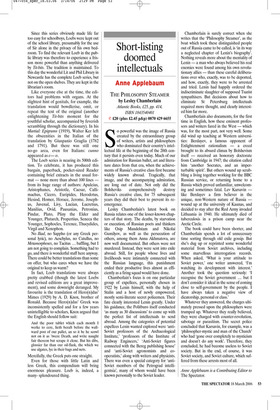Short-listing doomed intellectuals
Anne Applebaum
THE PHILOSOPHY STEAMER by Lesley Chamberlain Atlantic Books, £25, pp. 414, ISBN 1843540401 ✆ £20 (plus £2.45 p&p) 0870 429 6655 So powerful was the image of Russia created by the extraordinary group of writers, artists and philosophers who dominated their country’s intellectual life at the beginning of the 20th century that it persists even today. Much of our admiration for Russian ballet, art and literature dates from that era, when the achievements of Russia’s creative class first became widely known abroad. Tragically, that image, and the accompanying admiration, are long out of date. Not only did the Bolsheviks comprehensively destroy Russia’s creative class, for 75 subsequent years they did their best to prevent its reemergence.
Lesley Chamberlain’s latest book on Russia relates one of the lesser-known chapters of that story. The deaths, by starvation or execution, of Russian poets and thinkers like Osip Mandelstam and Nikolai Gumilyov, as well as the persecution of others, among them Anna Akhmatova, are now well documented. But others were not murdered. Instead, they were sent into exile abroad. Still, for people whose lives and livelihoods were intimately connected with the Russian language, this punishment ended their productive lives almost as efficiently as a firing squad would have done.
Chamberlain’s focus is on one particular group of expellees, personally chosen in 1922 by Lenin himself, with the help of Stalin and a host of newly empowered, mostly semi-literate secret policemen. Their fate clearly interested Lenin greatly. Under his guidance, the Politburo itself conducted ‘as many as 30 discussions’ to come up with the perfect list of intellectuals to send abroad. Among the categories of potential expellees Lenin wanted explored were ‘antiSoviet professors of the Archaeological Institute,’ ‘professors of the Institute of Railway Engineers,’ ‘Anti-Soviet figures connected with the Bereg publishing house’ and ‘anti-Soviet agronomists and cooperatists,’ along with writers and physicists. There was even a special category for ‘antiSoviet members of the Petrograd intelligentsia’, many of whom would have been known personally to the Soviet leader. Chamberlain is surely correct when she writes that the ‘Philosophy Steamer’, as the boat which took these distinguished people out of Russia came to be called, is ‘in its way a neglected chapter of Lenin’s biography’. Nothing reveals more about the mentality of Lenin — a man who always believed his real enemies were found among his own revolutionary allies — than these careful deliberations over who, exactly, was to be deported, and how, exactly, they were to be arrested and tried. Lenin had happily ordered the indiscriminate slaughter of supposed Tsarist sympathisers. But decisions about how to eliminate St Petersburg intellectuals required more thought, and clearly interested him far more.
Chamberlain also documents, for the first time in English, how these eminent professors and writers fared in the West — which was, for the most part, not very well. Some did wind up teaching at Western universities: Berdayev, a famous opponent of Enlightenment rationalism — a creed brought to its absurd climax by Bolshevism itself — received an honorary doctorate from Cambridge in 1947; the citation called him ‘another Socrates, and an imperturbable spirit’. But others wound up scrabbling a living together working for the BBC Russian service, or returning home to a Russia which proved unfamiliar, unwelcoming and sometimes fatal. Lev Karsavin like Berdayev a firm believer in the unique, non-Western nature of Russia wound up at the university of Kaunas, and decided to stay after the Red Army invaded Lithuania in 1940. He ultimately died of tuberculosis in a prison camp near the Arctic Circle.
The book could have been shorter, and Chamberlain spends a lot of unnecessary time sorting through old exile gossip. But she’s dug up or reprinted some wonderful material from Soviet archives, including some marvellous interrogation records. When asked, ‘What is your attitude to Soviet power,’ one writer answered, ‘I’m watching its development with interest.’ Another took the question seriously: ‘I recognise the Soviet government ... but I don’t consider it ideal in the sense of coming close to self-government by the people. I have always taken a negative view of dicatorship, personal or class.’ Whatever they answered, the charges ultimately pressed upon the philosophers were trumped up. Whatever they really believed, they were charged with counter-revolution, sabotage or parasitism. The secret police concluded that Karsavin, for example, was a ‘philosopher-mystic and man of the Church’ who had ‘gone over completely to mysticism and doesn’t do any work’. Therefore, they concluded, he had become useless to Soviet society. But in the end, of course, it was Soviet society, and Soviet culture, which suffered from these arrests most of all.


















































































 Previous page
Previous page